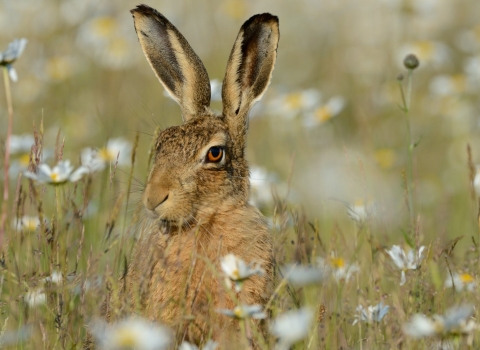Put your feet up and enjoy!
Somerset's very special wildlife and natural environment has inspired authors throughout the ages. We've created an exclusive content collection called Sundays@6 where we're going to feature invited authors reading from their books to bring you a moments of nature-writing peace as a way to round up your weekend.
The first series is readings by Somerset Wildlife Trust President, naturalist and author, Stephen Moss from his wonderful books. We will be posting a new video here every Sunday at 6pm for your listening pleasure. You can also tune in via any of our social media channels.
Episode 8: The Accidental Countryside: Hidden Havens For Britain's Wildlife
Previous episodes
Catch up with the previous readings below!
Episode 1: Wild Hares and Hummingbirds (Intro and April)
Join Stephen Moss, for a year in the idyllic village of Mark on the Somerset Levels – a watery wonderland rich in nature and wildlife, from birds to butterflies and badgers.
Deeply informative and profoundly inspiring, Wild Hares and Hummingbirds is a celebration of the Great British countryside, animals and the natural world. This passage is the introduction to the book and the April chapter, featuring the return of swallows to the village.
This reading is the introduction to the book, as well as the April passage - documenting the return of swallows to the village.
Episode 2: Wild Hares and Hummingbirds (May)
Join Stephen Moss, for a year in the idyllic village of Mark on the Somerset Levels – a watery wonderland rich in nature and wildlife, from birds to butterflies and badgers.
Deeply informative and profoundly inspiring, Wild Hares and Hummingbirds is a celebration of the Great British countryside, animals and the natural world. This passage is the May chapter, featuring cuckoos and reed warblers.
Episode 3: The Robin: A Biography (Intro)
No other bird is quite so ever-present and familiar, so embedded in our culture, as the robin. With more than six million breeding pairs, the robin is second only to the wren as Britain’s most common bird. It seems to live its life alongside us, in every month and season of the year. But how much do we really know about this bird?
Episode 4: The Wren: A Biography (intro)
The wren is a paradox of a bird. On the one hand wrens are ubiquitous. They are Britain’s most common bird, with 8.5 million breeding pairs and have by far the loudest song in proportion to their size. They also thrive up and down Britain and Ireland: from the smallest city garden to remote offshore islands, blustery moors to chilly mountains.
Yet many people, particularly a younger generation, are not sure if they have ever seen a wren. Perhaps because the wren is so tiny, weighing just as much as two A4 sheets of paper, and so busy, always on the move, more mouse than bird.
However if we cast our eyes back to recent history wrens were a mainstay of literary, cultural and popular history. The wren was on postage stamps and the farthing, it featured in nursery rhymes and greetings cards, poems and rural ‘wren hunts’, still a recent memory in Ireland particularly.
This captivating year-in-the-life biography reveals the hidden secrets of this fascinating bird that lives right on our doorstep.
Episode 5: Mrs Moreau's Warbler (Intro)
Swallow and starling, puffin and peregrine, blue tit and blackcap. We use these names so often that few of us ever pause to wonder about their origins. What do they mean? Where did they come from? And who created them?
The words we use to name birds are some of the most lyrical and evocative in the English language. They also tell incredible stories: of epic expeditions, fierce battles between rival ornithologists, momentous historical events and touching romantic gestures
Episode 6: Mrs Moreau's Warbler (Prologue)
In this reading from 'Mrs Moreau's Warbler: How Birds Got Their Names', Stephen Moss tells the story of the titular Mrs Moreau's Warbler, and the woman after which it is named.
Episode 7: Mrs Moreau's Warbler (Epilogue)
Stephen Moss tells the story of spying this magnificent bird himself, in the mountains of Tanzania.
Enjoyed the readings?
Do you have a favourite book you'd like to hear read next week?
Join us on Facebook, Twitter or Instagram and vote for what you want to hear next!
Keep up to date with our work across the county
Sign up below to receive the latest news from Somerset Wildlife Trust, learn about great events near you and learn how you can help wildlife in your local area.

